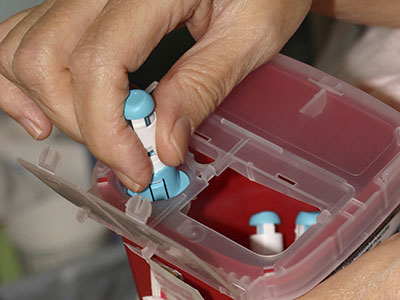Medical Waste Disposal in CT

Medical Waste Disposal in CT
Covered by our Prospect, CT Branch:
Phone: 800.378.8824
Headquartered in Prospect, Connecticut since 1997, BioServ knows CT medical waste regulations inside and out. Not only do we offer great value and exceptional service, but we ensure complete environmental compliance for all of your medical waste disposal, including pharmaceutical, chemical and electronic waste. All across the Constitution State—from Bristol, Middlebury, and Waterbury to Watertown, Naugatuck, and Southbury—customers rely on us for customized medical waste management solutions at affordable prices.
Request a FREE quote
Why Choose Us
-
Dedicated Customer Service
One of our experienced staff members is always available to answer questions or solve a problem.
-
No-Hassle
Call it in, fax it in or order online. Any way you choose, it will be simple and won't waste your valuable time.
-
Competitive Pricing
On average, customers are seeing a cost savings of 50% or greater.
-
Customized Plans
From medical, hazardous, pharmaceutical, and electronic regulated waste, BioServ can handle all your biomedical needs.
BioServ Serves All of Connecticut, Including:
- Bristol
- Middlebury
- Waterbury
- Watertown
- Naugatuck
- Southbury
Connecticut Hazardous Pharmaceutical Waste Regulations
Connecticut is the only state in the country that has not adopted the 2008 federal EPA ruling de-regulating epinephrine-based medications. CT DEEP still recognizes epinephrine in any formulation as an RCRA hazardous waste, and therefore it must be managed accordingly. It is critical that Connecticut's medical practices take extra precaution to ensure they are properly managing their waste pharmaceuticals, and BioServ can help.

Other CT Medical Waste Regulations
- Chemotherapy Waste Chemotherapy waste (any waste that has come in contact with an antineoplastic agent) must be disposed of by incineration.
- Pathological Waste Pathological waste (human tissue, organs, or body parts (excluding teeth) removed during a medical procedure or autopsy) must be disposed of by incineration or interment.
- Regulated Medical Waste/Infectious Waste Regulated medical waste or infectious waste is sharps, needles, broken glass, slides, surgical instruments, tubing, blood, blood-soaked materials, bodily fluids (OPIM), and any items contaminated with blood or bodily fluids (OPIM).
- Biomedical Waste Storage Biomedical waste must be stored in labeled containers separate from other waste. It must be kept in a locked area with restricted access and must be protected from water, precipitation, wind, and animals.
- Medical Waste Generators Medical waste generators are required to create and maintain facility-specific biomedical waste management plans, to train employees regularly in proper waste segregation procedures, and to keep all disposal records on-site for 3 years.
- Small Quantity Generator Status Those generating less than 50 lbs of biomedical waste in a month or in a single shipment are considered Small Quantity Generators. SQGs are subject to fewer regulations.








